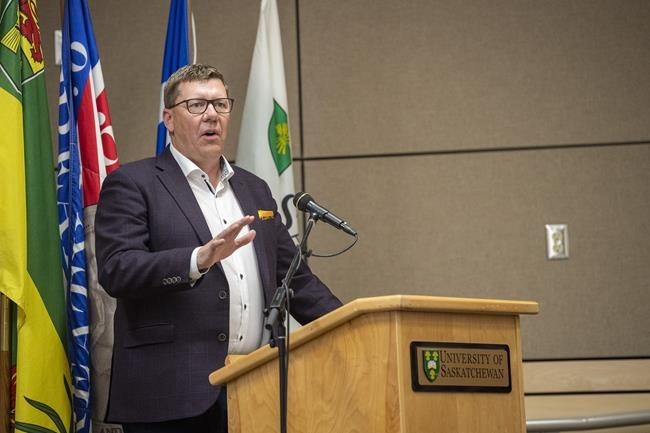SASKATOON — Premier Scott Moe touted Saskatchewan’s economic prosperity driven by windfall resource revenues in a speech to business leaders while also signalling the federal government would remain a main focus for the Saskatchewan Party in the upcoming legislative session.
"There is a strong tailwind that's pushing this province forward in a world where the paramount concern is energy security and, ultimately, food security," Moe said Monday at a luncheon hosted by the Saskatchewan Chamber of Commerce.Â
Moe's comments come ahead of Wednesday’s speech from the throne, when the Saskatchewan Party government is to lay out its agenda as it predicts a balanced budget for the fiscal year.
Russia's war in Ukraine has left global markets with dwindling supplies and skyrocketing prices. It has resulted in surging revenues and expectations of increased production for Saskatchewan's potash, uranium and agriculture industries.
Moe said the province's resource industry is proving essential at home and abroad. Saskatchewan has already passed some growth targets and is forecast to have the fastest growing economy of any region in the country, Moe said.Â
“We are on the cusp of something we have not seen before," he said.Â
Opposition New Democrats Leader Carla Beck responded that resource profits may be increasing but people in Saskatchewan are struggling to make ends meet and the health-care system is in crisis.
“While Scott Moe is bragging about how well his provincial coffers are doing, not a cent of that windfall revenue is making it down to the people of this province — the true owner of those resources," Beck said in a statement.
She said the Moe government is falling short and that's what she'll focus on during the fall sitting of the legislature.
Moe also said his government plans to introduce legislation ensuring jurisdiction over provincial resources. The actions would be within the constitution, he added, without providing many details.
Moe has long been pushing against Prime Minister Justin Trudeau and the Liberal government's environmental policies in the name of the resource sector. The premier cautioned against policies only focused on the environment that are motivated by ideology.
Earlier this month, he said he was prepared to take legal action over federal regulations on pollution. He also released a policy paper highlighting the government's plan to flex its autonomy, including with a bill introduced this fall to address federalism.Â
Daniel Westlake, a political studies assistant professor at the University of Saskatchewan, said it's expected Moe's government will keep its sights set on Ottawa.Â
However, there's not a lot the provincial government can do on these issues, Westlake said, pointing to the challenge against the carbon tax that was struck down by the Supreme Court of Canada.Â
"You can legislate that Saskatchewan is going to defend it's natural resources but it already has power over its natural resources, so that doesn't really change much," he said.Â
Westlake said even without causing much of an impact, these types of actions can play well with the Saskatchewan Party's voter base.
Moe spoke about a workers' shortage across Saskatchewan, urging business leaders to push Ottawa for a Canada-Saskatchewan immigration accord, similar to the one in Quebec, that could bump up the cap to 13,000 people a year.Â
"We are not short of jobs. We are short of people," Moe said.
The throne speech is also to include information about an international trade office in the European Union, Moe added. It will mark the ninth such office in different places around the world. The premier said it will help discussions with countries being significantly affected by global energy and food depletions see Saskatchewan as a viable and sustainable solution.Â
The increased resource prices have had a positive effect on the provincial coffers, Moe said, adding his government is carefully approaching the current flush of finances.
Following a long-term boom in resource revenues, Saskatchewan saw a ballooning deficit in the years before former premier Brad Wall resigned in 2017. Low oil and potash prices resulted in layoffs, hiring freezes and an austerity budget that cut library and education funding, as well as grants to municipalities and saw an increase to the provincial sales tax.
Moe said the current resources revenues won't be baked into annual investments in health care or education.
"We don't ever want to be in a position in Saskatchewan where we are hiring or firing nurses or teachers on the price of a barrel of oil or a ton of potash."
This report by The Canadian Press was first published Oct. 24, 2022.Â
Kelly Geraldine Malone, The Canadian Press




